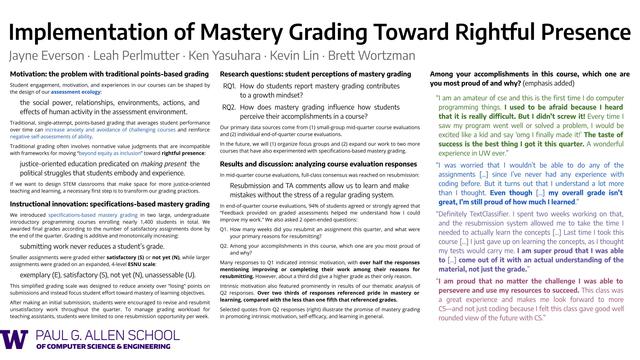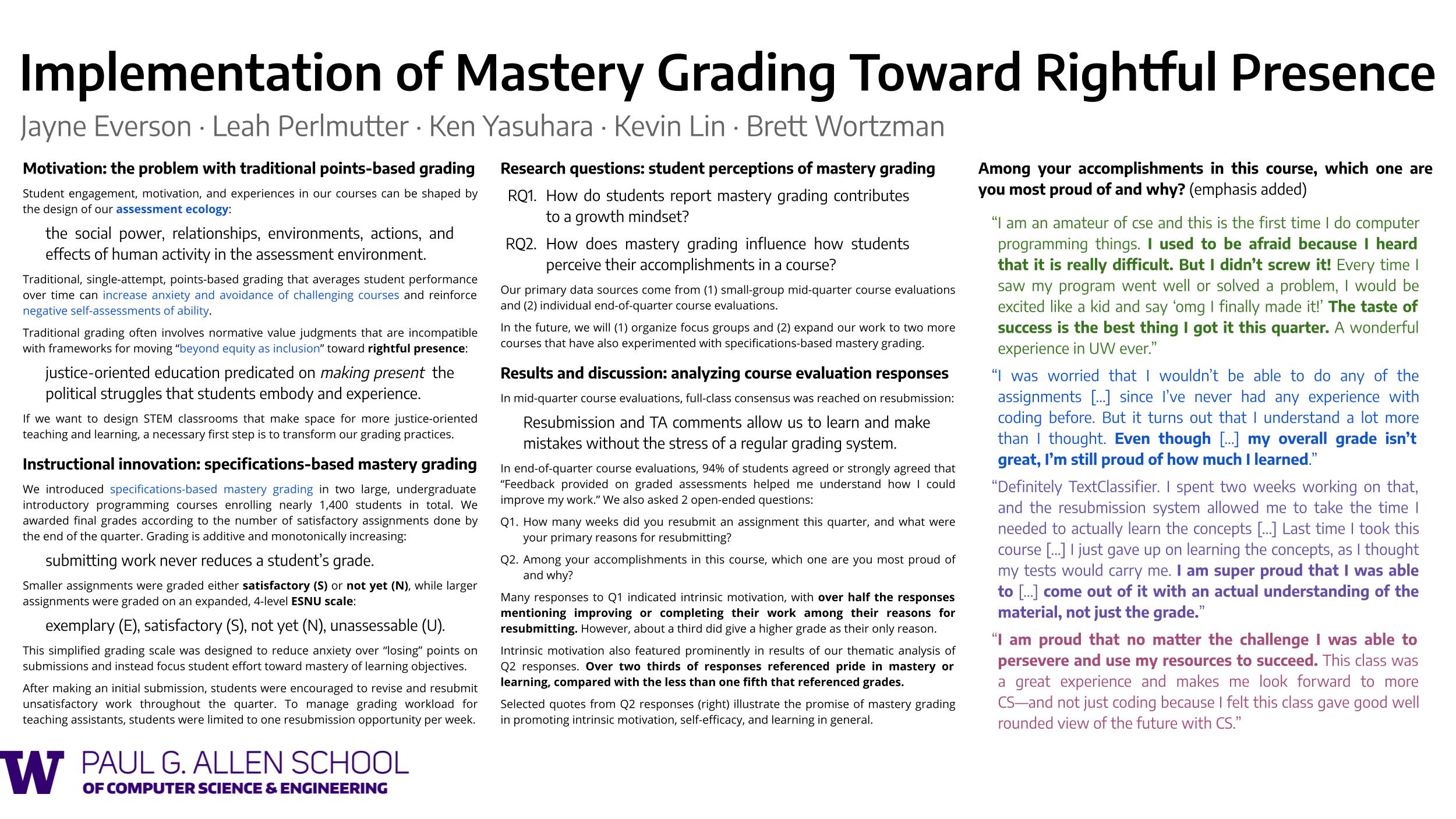Skip to main contentResource added 
This poster describes our experiences with specifications-based mastery grading (Talbert 2017, Nilson 2014, Feldman 2018) in two large, undergraduate introductory programming courses enrolling nearly 1,400 students in total. Rather than averaging together point scores from multiple assignments, final grades were awarded based on the number of satisfactory assignments completed by the end of the quarter. Smaller assignments were graded either satisfactory (S) or not yet (N), while larger assignments were graded on an expanded, 4-level scale. Students were given the opportunity to revise and resubmit any unsatisfactory work at regular intervals throughout the quarter.
We seek to understand how students perceive mastery grading contributes to a growth mindset. In feedback collected at mid-quarter, in both courses, students almost unanimously agreed that the opportunity to resubmit work facilitated learning and reduced stress around assignments. We will also present: feedback collected in the end-of-quarter course evaluation on growth mindset and motivations for revising work; considerations for implementing mastery grading in large-enrollment courses, such as handling resubmissions; and faculty conceptions of normative grade distributions and rightful presence.
Implementation of Mastery Grading Toward Rightful Presence

Full description
Video Presentation
Authors:
- Jayne Everson, Computer Science & Engineering, UW Seattle
- Leah Perlmutter, Computer Science & Engineering, UW Seattle
- Ken Yasuhara, Engineering Teaching & Learning, UW Seattle
- Kevin Lin, Computer Science & Engineering, UW Seattle
- Brett Wortzman, Computer Science & Engineering, UW Seattle
Abstract:
The design of instructional assessment ecology can affect student engagement, motivation, and experience in a course. Research has shown that traditional, single-attempt, points-based grading can increase anxiety and avoidance of challenging courses (Chamberlin 2018). Rather than serving to motivate students, traditional grading can demotivate students and reinforce negative self-assessments of ability (Gorson and O’Rourke 2019). Traditional grading that emphasizes normative value judgments is incompatible with frameworks for moving “beyond equity as inclusion” and towards rightful presence (Barton and Tan 2020): justice-oriented teaching and learning predicated on the deconstruction of oppressive power dynamics. While changing grading practices alone is not sufficient to achieve rightful presence, it can be a necessary first step towards creating a more just and equitable classroom.This poster describes our experiences with specifications-based mastery grading (Talbert 2017, Nilson 2014, Feldman 2018) in two large, undergraduate introductory programming courses enrolling nearly 1,400 students in total. Rather than averaging together point scores from multiple assignments, final grades were awarded based on the number of satisfactory assignments completed by the end of the quarter. Smaller assignments were graded either satisfactory (S) or not yet (N), while larger assignments were graded on an expanded, 4-level scale. Students were given the opportunity to revise and resubmit any unsatisfactory work at regular intervals throughout the quarter.
We seek to understand how students perceive mastery grading contributes to a growth mindset. In feedback collected at mid-quarter, in both courses, students almost unanimously agreed that the opportunity to resubmit work facilitated learning and reduced stress around assignments. We will also present: feedback collected in the end-of-quarter course evaluation on growth mindset and motivations for revising work; considerations for implementing mastery grading in large-enrollment courses, such as handling resubmissions; and faculty conceptions of normative grade distributions and rightful presence.
Poster PDF
View a PDF version of the poster in Google Drive to enlarge the image or download a copy.
Comments
The presenter for this poster will be available to respond to comments during Poster Session 1 on April 20, 2:00-2:50 p.m.Comments
to view and add comments.
Annotations
No one has annotated a text with this resource yet.
- typeImage
- created on
- file formatjpg
- file size632 kB
- publisherUniversity of Washington
- rights


